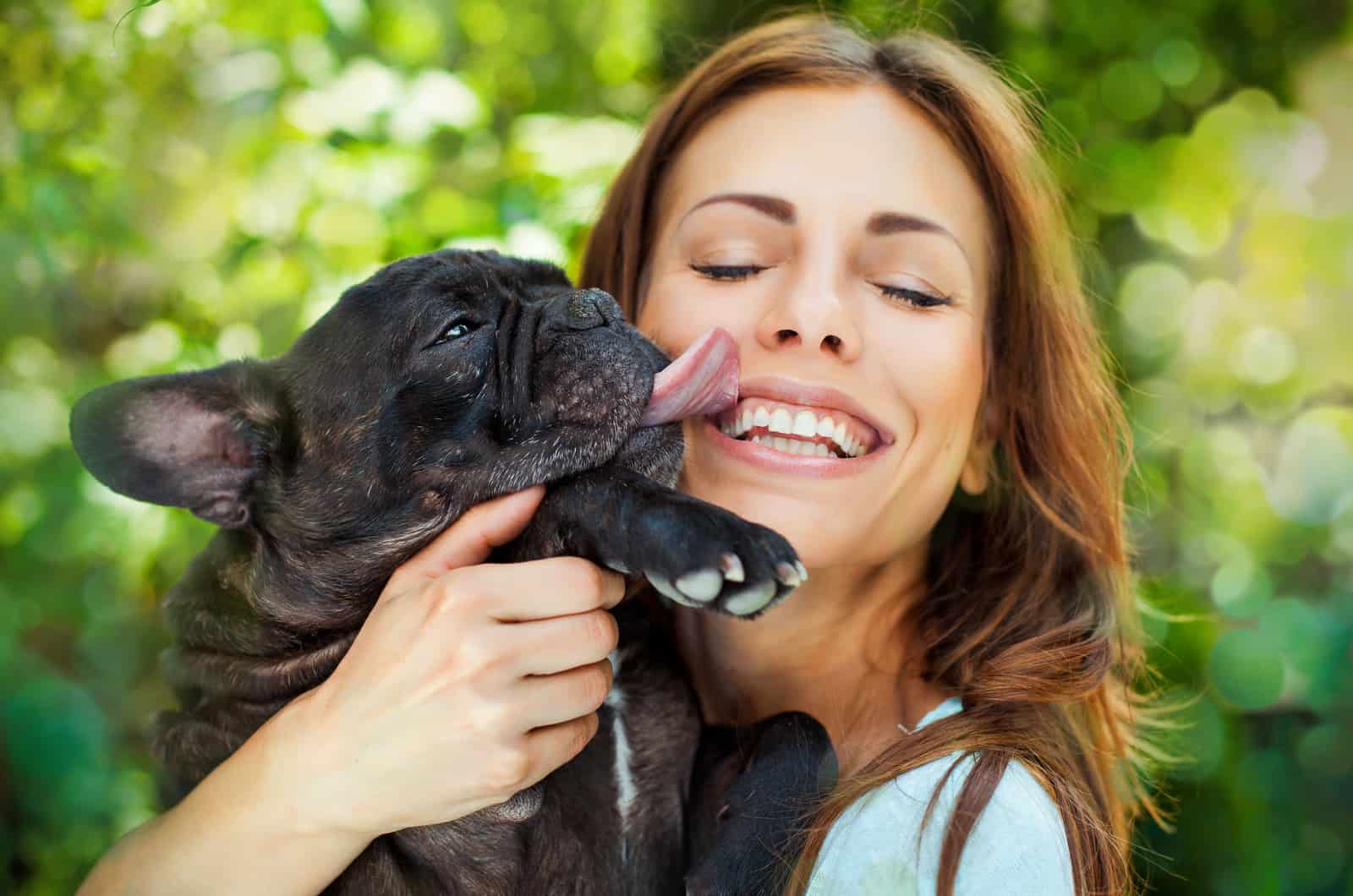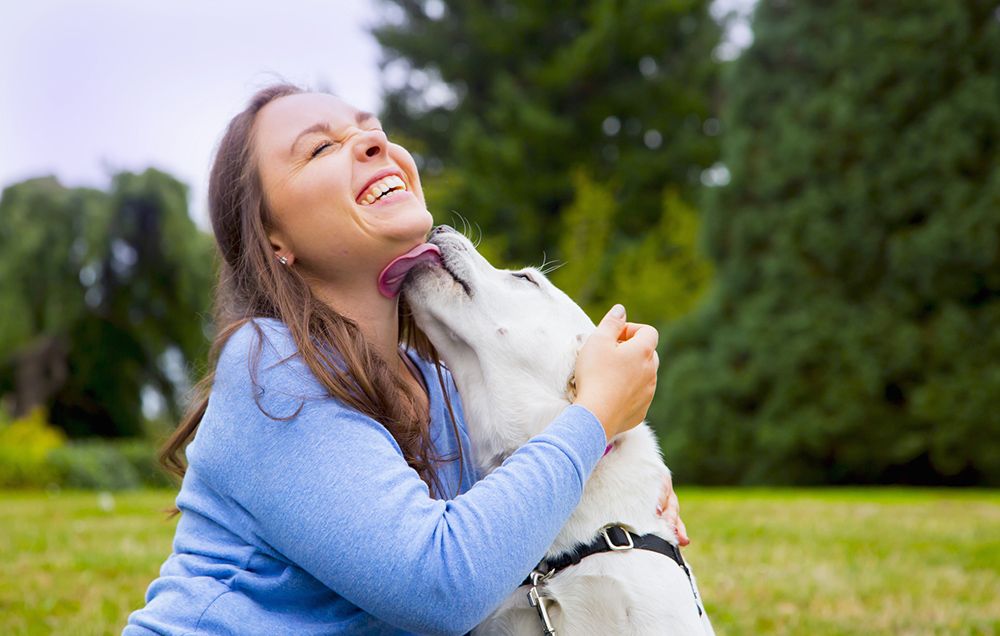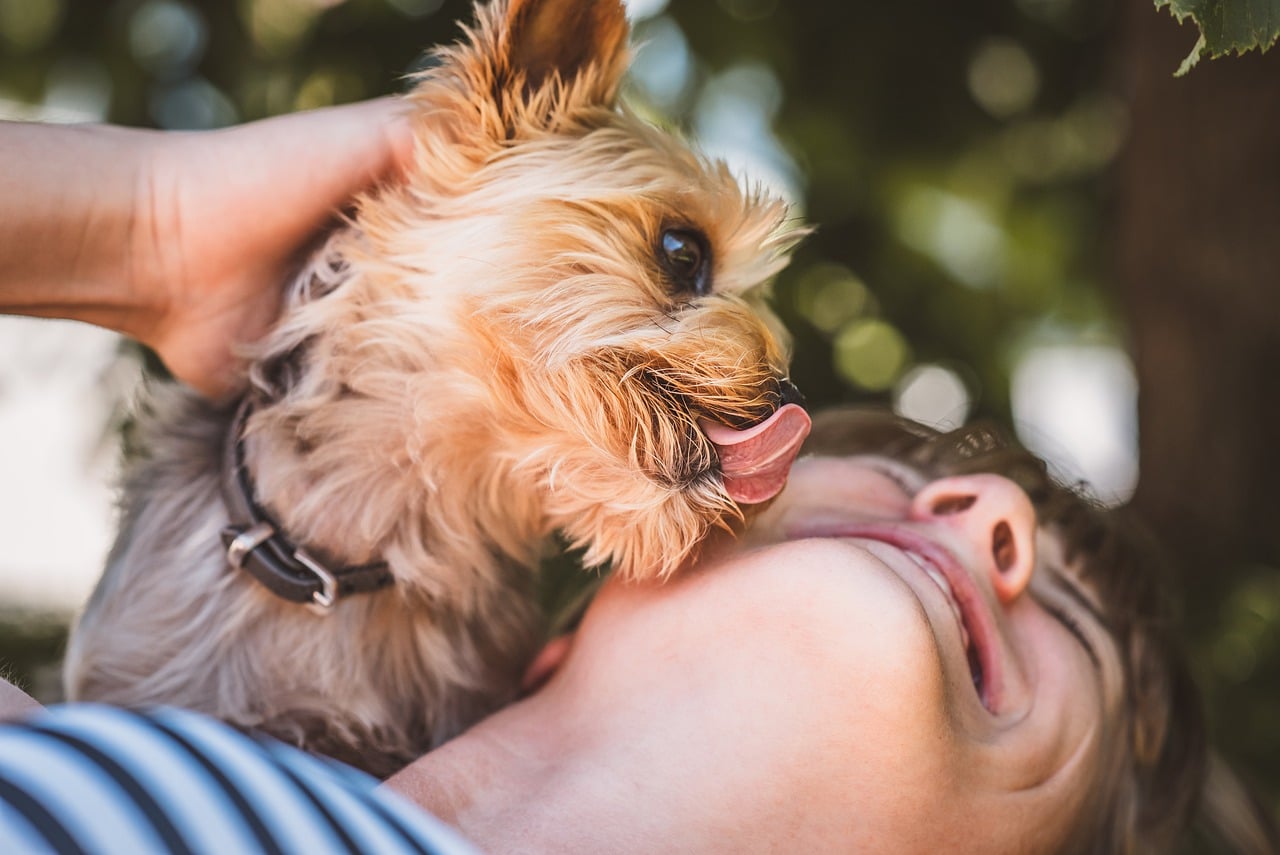Dogs have a curious habit of licking our faces, and while some people find it endearing, others may find it rather off-putting. If you’ve ever wondered why your furry friend insists on giving you sloppy kisses, you’re not alone. In this comprehensive guide, we’ll explore the various reasons behind this behavior, delve into the psychology of dog licking, and offer tips on how to manage it.
Before we dive into the specifics of why dogs lick faces, it’s important to understand a bit about canine behavior. Dogs communicate with us and with each other through a variety of gestures, vocalizations, and actions. Licking is just one of the many ways in which dogs express themselves and interact with their environment.
7 Reasons Why Your Dog Licks Your Face

1. Affection and Bonding
When your dog licks your face, it’s often a display of affection and a way to strengthen the bond between you and them. Dogs are social animals that form strong attachments to their human companions, and licking is one of the ways they express their love and loyalty. It’s a behavior rooted in their natural inclination to seek closeness and connection with their pack members.
2. Social Interaction
In the wild, canines engage in grooming behaviors as a form of social interaction and bonding within the pack. Licking is a similar grooming behavior, and when your dog licks your face, they may be trying to reinforce the social bond between you and them. It’s their way of communicating that you’re part of their pack and that they care about you.
3. Exploration and Curiosity
Dogs experience the world through their senses, and licking is one way they explore and interact with their environment. When your dog licks your face, they’re gathering information about you, such as your scent and taste. It’s their way of getting to know you better and understanding their surroundings. In this sense, licking serves as a form of communication and sensory exploration for dogs.
4. Attention-Seeking Behavior

Like humans, dogs crave attention and affection from their owners. When your dog licks your face, it may be a way for them to seek attention and affection from you. They learn that licking gets a reaction from you, whether it’s a smile, a laugh, or simply acknowledgment, and they continue to do it to get more of your attention. In this way, licking becomes a learned behavior that reinforces the bond between you and your dog.
5. Stress Relief
Licking can be a self-soothing behavior for dogs, especially in times of stress or anxiety. When your dog feels overwhelmed or anxious, they may turn to licking as a way to calm themselves down and relieve tension. Licking releases endorphins in the brain, which can have a calming effect similar to that of human comfort food or a hug. In this way, licking serves as a coping mechanism for dogs to manage their emotions and alleviate stress.
6. Instinctual Behaviors
Some licking behaviors in dogs are rooted in their instincts and natural behaviors. For example, mother dogs lick their puppies to groom them, stimulate their bowels, and bond with them. Similarly, wild canids such as wolves and coyotes regurgitate food for their young, and licking may be a remnant of this behavior in domestic dogs. These instinctual behaviors serve important functions in nurturing and caring for offspring, and they may manifest as licking behavior in various contexts.
7. Communication of Needs
In some cases, licking may be your dog’s way of communicating their needs or desires to you. For example, if your dog licks your face when you’re eating, they may be trying to communicate that they’re hungry or want a share of your food. Pay attention to the context and timing of your dog’s licking behavior to better understand what they’re trying to tell you. By observing their body language and the circumstances surrounding their licking, you can decipher their communication cues and respond accordingly.
Is Dog Licking Harmful?

1. Bacteria and Germs
Dogs’ mouths can harbor a variety of bacteria and germs, some of which can be transferred to humans through licking. While most of these bacteria are harmless to humans, there is a small risk of infection, particularly for individuals with weakened immune systems or open wounds. Certain bacteria, such as Staphylococcus and Pasteurella, can cause skin infections or other health issues if they enter the body through broken skin or mucous membranes.
2. Zoonotic Diseases
In addition to bacteria, dogs can also carry certain parasites and zoonotic diseases in their mouths, saliva, and feces. Zoonotic diseases are illnesses that can be transmitted from animals to humans, and some of the pathogens that dogs may carry include:
- Hookworms: These parasitic worms can cause skin irritation, itching, and gastrointestinal issues in humans if transmitted through contact with contaminated feces or soil.
- Ringworm: Despite its name, ringworm is not caused by worms but by a fungus that can be spread through direct contact with infected animals or their environment. It can cause skin infections characterized by red, itchy, circular patches.
- Salmonella: This bacteria can cause food poisoning in humans if ingested through contaminated food or water, including food or objects licked by dogs that carry the bacteria in their mouths.
3. Allergic Reactions
Some people may be allergic to proteins found in dog saliva, which can lead to allergic reactions such as itching, redness, swelling, or hives when licked by a dog. While these allergic reactions are usually mild, in some cases, they can be more severe and require medical attention. Individuals with known allergies to dogs or pet dander should take precautions to minimize contact with dog saliva to prevent allergic reactions.
4. Dental Health
While not directly harmful to humans, excessive licking can contribute to dental health issues in dogs. Constant licking can lead to abrasion of the enamel on their teeth, which may increase the risk of dental decay, gum disease, and other oral health problems. Additionally, licking can deposit bacteria and food particles onto the dog’s teeth and gums, potentially exacerbating existing dental issues.
5. Behavioral Concerns
In some cases, excessive licking may be a symptom of underlying behavioral issues or medical conditions in dogs. Compulsive licking or obsessive licking can indicate anxiety, stress, boredom, or other emotional distress in dogs. If your dog’s licking behavior seems excessive, compulsive, or out of the ordinary, it’s essential to consult with a veterinarian or a certified animal behaviorist to rule out any underlying health issues and address the root cause of the behavior.
Managing Dog Licking Behavior

1. Establish Clear Boundaries
Setting clear boundaries with your dog regarding acceptable licking behavior is crucial. Consistently reinforce these boundaries through positive reinforcement and redirection techniques. For example, you may allow licking on your hands or arms but not on your face or mouth. Be firm and consistent in enforcing these boundaries to help your dog understand what is and isn’t allowed.
2. Redirect Their Attention
Provide your dog with alternative outlets for their licking behavior to redirect their attention away from licking you. Offer interactive toys, puzzle toys filled with treats, or chew toys to keep them occupied and mentally stimulated. Redirecting their focus onto these toys can help distract them from licking you and provide a positive outlet for their energy.
3. Positive Reinforcement
Use positive reinforcement techniques to encourage desirable behaviors and discourage excessive licking. When your dog refrains from licking or follows your cues to stop, praise them enthusiastically and offer rewards such as treats or verbal praise. Positive reinforcement helps reinforce the desired behavior and strengthens the bond between you and your dog.
4. Provide Mental Stimulation
Ensure that your dog receives plenty of mental stimulation and enrichment to prevent boredom and reduce the likelihood of excessive licking. Engage in interactive play sessions, obedience training, and puzzle-solving activities to keep your dog mentally engaged and fulfilled. A mentally stimulated dog is less likely to engage in unwanted behaviors such as excessive licking.
5. Address Underlying Issues
If your dog’s licking behavior persists despite your efforts to manage it, it’s essential to address any underlying issues that may be contributing to the behavior. Excessive licking can be a symptom of underlying medical conditions, such as allergies, skin irritation, or anxiety. Consult with your veterinarian to rule out any potential health issues and develop a comprehensive treatment plan to address the root cause of the licking behavior.
6. Seek Professional Help
If you’re struggling to manage your dog’s licking behavior on your own or if the behavior is causing significant issues, consider seeking help from a professional dog trainer or behaviorist. A certified professional can assess your dog’s behavior, provide personalized guidance and training techniques, and develop a behavior modification plan tailored to your dog’s specific needs. Professional help can be invaluable in addressing complex behavior issues and fostering a harmonious relationship between you and your dog.
Conclusion
Dog licking is a natural and instinctual behavior that serves various purposes, from expressing affection to seeking attention and relieving stress. While it’s generally harmless, excessive licking can be managed through training, setting boundaries, and providing alternative outlets for your dog’s behavior. By understanding the reasons behind your dog’s licking and implementing appropriate strategies, you can foster a healthy and harmonious relationship with your furry friend.


